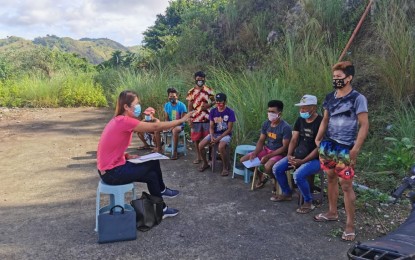
INSTITUTIONALIZED PROGRAM. Antique Provincial Board Member Karmila Rose Dimamay (left) interviews Antique's migrant sugar workers or sacadas in the town of Barbaza in May 2021. Dimamay said her ordinance institutionalizing the programs and projects for sacadas and their families was approved on final reading in a virtual session on Thursday (Sept. 16, 2021). (Photo courtesy of SP Karmila Rose Dimamay)
SAN JOSE DE BUENAVISTA, Antique – The Antique provincial board passed on Thursday an ordinance institutionalizing programs and projects for sacadas or migrant sugar workers (MSWs) in the province.
The ordinance titled “Programs and Projects for Sacadas and their Families” is to uplift their living conditions, said Board Member Karmila Rose Dimamay, author of the legislation which was approved on final reading during their virtual session.
“As I went around the province to interview the sacadas, I learned that they still have no database and some of them had not yet heard about the government programs for them,” she said in an interview.
The deployment of over 10,000 sacadas from Antique is already a century-old practice that could be traced back as early as the 1900s during the start of the sugarcane plantations in Negros Occidental and other sugar-producing provinces in the country.
“The MSWs/sacadas are the marginalized sector of the province, they are landless, unskilled with no regular work in the province, thus living below the poverty threshold,” the ordinance said.
In the ordinance, the Sacada Desk under the provincial government's Planning and Development Office (PPDO) is mandated to facilitate programs geared towards building the capacities of the sacadas through their enrolment with the Alternative Learning School (ALS) and occupational training skills program of the provincial program and/or endorsement or partnership with Technical Educational Skills Development Authority (TESDA).
“There should also be an establishment of a provincial database and profiling of sacadas,” Dimamay said.
The barangays also have to generate and furnish a list of their MSWs to the desk to determine the remaining sacadas in Negros Occidental or in other provinces where they are working.
The ordinance provides for the creation of an association of sacadas in barangays, federations in municipalities, and representation in Municipal and Provincial Development Councils to serve as an arm in awareness-raising activities, facilitate resource accessing, and capability building.
“There should also be strict monitoring for the availment of sacada in the mandated benefits while at work in the sugarcane plantations,” she said.
Dimamay said the sacadas should be enrolled with the Social Security System (SSS), Philippine Health Insurance Corporation (PhilHealth), and other benefits.
She said milling supervisors shall be mandated to submit a summary of contributions duly received/endorsed by the SSS and PhilHealth to the Sacada Desk.
“The summary of contributions is necessary because there were some sacadas who had been thinking all the while that they had SSS contributions, but only to know later then that their milling supervisors did not make any contribution for them,” she said. (PNA)
